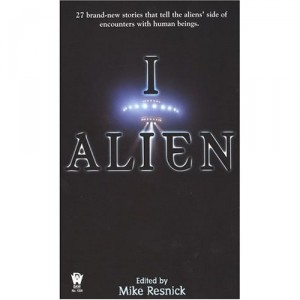 Mike Resnick has never shied away from asking a lot from the authors who grace his collections. In the past, his anthologies have covered all manner of alternate realities, pasts, and futures, male authors have been asked to write as female, and female writers as male. Now he asks them to take a real leap of the imagination, in I, Alien. A whopping twenty-seven stories take a look at things from an alien perspective, looking at a wide variety of topics in the process. There’s a wide range of tones to be found here, allowing for comedy (Laura Resnick’s “Diary of a Galactic Émigré,” in which an alien finds out the hard way that his chosen disguise is not that of the Earth’s dominant species) and drama (Kristine Kathryn Rusch’s “The Injustice Collector” is the story of an interspecies trial brought about by radical misunderstandings, and multiple interpretations of the same basic concepts.)
Mike Resnick has never shied away from asking a lot from the authors who grace his collections. In the past, his anthologies have covered all manner of alternate realities, pasts, and futures, male authors have been asked to write as female, and female writers as male. Now he asks them to take a real leap of the imagination, in I, Alien. A whopping twenty-seven stories take a look at things from an alien perspective, looking at a wide variety of topics in the process. There’s a wide range of tones to be found here, allowing for comedy (Laura Resnick’s “Diary of a Galactic Émigré,” in which an alien finds out the hard way that his chosen disguise is not that of the Earth’s dominant species) and drama (Kristine Kathryn Rusch’s “The Injustice Collector” is the story of an interspecies trial brought about by radical misunderstandings, and multiple interpretations of the same basic concepts.)
For the down to Earth, there’s Paul E. Marten’s “Creature For Hire,” which shows that even an alien can fall upon hard times in the fickle eyes of the public. Michael Burstein’s “Pedagogy” examines the differences in education and discipline between an alien species and Earthlings, leading to the sort of resolution we’ve all wished upon obnoxious people at one point or another. Janis Ian’s “Correspondence With A Breeder” is a hilarious piece about time travel, would-be-writers, a famous editor, and some major miscommunications.
Just to show that anthropology is alive and well on other planets, we have Barbara Delaplace’s “Resident Alien.” Proving that aliens come in all sizes, including the mindbogglingly small, there’s “Aortic Insubordination,” by Batya Swift Yasgur and Barry N. Malzberg. Josepha Sherman’s “What Must Be” is a thoughtful, tragic story about coming-of-age rituals, and the consequences that arise when traditions and customs are violated, even unwillingly.
Communication is essential when negotiating contracts and business deals between races. Just look at the narrator of Linda J. Dunn’s “First Contract,” who discovers the hard way why his species has had such trouble in the past dealing with humans. Is it madness, however, to expand one’s worldview? Tobias S. Buckell looks at a strange semi-symbiotic/slave relationship between humans and a native species in “Anakoinosis.” Who’s benefiting more: the humans who get slave labor out of the aliens, or the aliens who learn through their dealings with us?
Adrienne Gormley also looks at rites of passage, in “Nobodies.” To prove one’s worth to the tribe, they first have to survive a period of testing. But have the worthiest been surviving all these years, or just the most dangerous? John DeChancie’s “The Loaves and the Fishes” postulates that the concept of a Witness Protection Program may exist on other planets, with interesting results for the alien who hides here on Earth. Mike Resnick himself explains the truth behind our origins; it’s less spectacular than one might imagine.
These are just some of the stories to be found in I, Alien. Tales by Robert Sawyer, Nina Kiriki Hoffman, Terry McGarry, Harry Turtledove, and Stephen Leigh also help to flesh out a collection that’s consistently entertaining, occasionally thought-provoking, and well-worth picking up. I thoroughly enjoyed this anthology.
